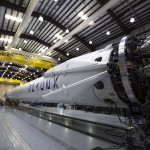
 The name “Project Sauron” came from code contained in one of the malware’s configuration files. (credit: Kaspersky Lab) Security experts have discovered a malware platform that’s so advanced in its design and execution that it could probably have been developed only with the active support of a nation state. The malware—known alternatively as “ProjectSauron” by researchers from Kaspersky Lab and “Remsec” by their counterparts from Symantec—has been active since at least 2011 and has been discovered on 30 or so targets. Its ability to operate undetected for five years is a testament to its creators, who clearly studied other state-sponsored hacking groups in an attempt to replicate their advances and avoid their mistakes. State-sponsored groups have been responsible for malware like the Stuxnet- or National Security Agency-linked Flame , Duqu , and Regin . Much of ProjectSauron resides solely in computer memory and was written in the form of Binary Large Objects, making it hard to detect using antivirus. Because of the way the software was written, clues left behind by ProjectSauron in so-called software artifacts are unique to each of its targets. That means that clues collected from one infection don’t help researchers uncover new infections. Unlike many malware operations that reuse servers, domain names, or IP addresses for command and control channels, the people behind ProjectSauron chose a different one for almost every target. Read 8 remaining paragraphs | Comments
The name “Project Sauron” came from code contained in one of the malware’s configuration files. (credit: Kaspersky Lab) Security experts have discovered a malware platform that’s so advanced in its design and execution that it could probably have been developed only with the active support of a nation state. The malware—known alternatively as “ProjectSauron” by researchers from Kaspersky Lab and “Remsec” by their counterparts from Symantec—has been active since at least 2011 and has been discovered on 30 or so targets. Its ability to operate undetected for five years is a testament to its creators, who clearly studied other state-sponsored hacking groups in an attempt to replicate their advances and avoid their mistakes. State-sponsored groups have been responsible for malware like the Stuxnet- or National Security Agency-linked Flame , Duqu , and Regin . Much of ProjectSauron resides solely in computer memory and was written in the form of Binary Large Objects, making it hard to detect using antivirus. Because of the way the software was written, clues left behind by ProjectSauron in so-called software artifacts are unique to each of its targets. That means that clues collected from one infection don’t help researchers uncover new infections. Unlike many malware operations that reuse servers, domain names, or IP addresses for command and control channels, the people behind ProjectSauron chose a different one for almost every target. Read 8 remaining paragraphs | Comments
See the original post:
Researchers crack open unusually advanced malware that hid for 5 years

 An anonymous reader writes:Whoever said crime doesn’t pay didn’t know about the booming ransomware market. A case in point, the latest version of the scourge known as CryptXXX, which raked in more than $45, 000 in less than three weeks. Over the past few months, CryptXXX developers have gone back and forth with security researchers. The whitehats from Kaspersky Lab provided a free tool that allowed victims to decrypt their precious data without paying the ransom, which typically reaches $500 or more. Then, CryptXXX developers would tweak their code to defeat the get-out-of-jail decryptor. The researchers would regain the upper hand by exploiting another weakness and so on. Earlier this month, the developers released a new CryptXXX variant that to date still has no decryptor available. Between June 4 and June 21, according to a blog post published Monday by security firm SentinelOne, the Bitcoin address associated with the new version had received 70 bitcoins, which at current prices is valued at around $45, 228. The figure doesn’t include revenue generated from previous campaigns. Read more of this story at Slashdot.
An anonymous reader writes:Whoever said crime doesn’t pay didn’t know about the booming ransomware market. A case in point, the latest version of the scourge known as CryptXXX, which raked in more than $45, 000 in less than three weeks. Over the past few months, CryptXXX developers have gone back and forth with security researchers. The whitehats from Kaspersky Lab provided a free tool that allowed victims to decrypt their precious data without paying the ransom, which typically reaches $500 or more. Then, CryptXXX developers would tweak their code to defeat the get-out-of-jail decryptor. The researchers would regain the upper hand by exploiting another weakness and so on. Earlier this month, the developers released a new CryptXXX variant that to date still has no decryptor available. Between June 4 and June 21, according to a blog post published Monday by security firm SentinelOne, the Bitcoin address associated with the new version had received 70 bitcoins, which at current prices is valued at around $45, 228. The figure doesn’t include revenue generated from previous campaigns. Read more of this story at Slashdot. 